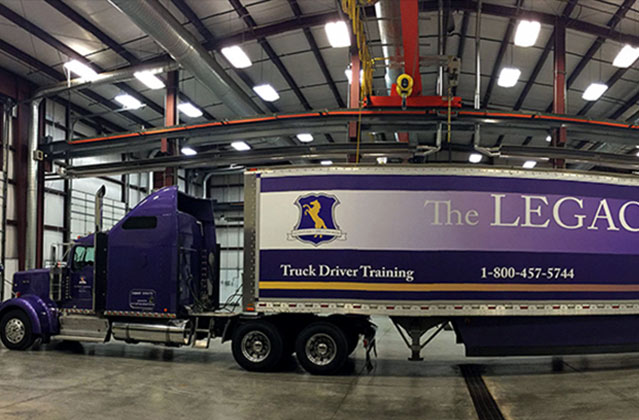Trucking Laboratory
The Legacy trucking laboratory is a room equipped for scientific research, supplied with lab equipment and apparatuses as common to chemistry, physics, and science labs. The action activity shift from instructor to participant in our lab lessons. The program offers a variety of experiments specific to trucking that take place in the trucking laboratory. These lessons are designed to assist you in learning basic principals of chemistry and physics as they are applied to trucking. The lessons include experiments that show you the changes that take place when the truck, its components, fuel and lubricants are exposed to climate changes and forces on the vehicle while in motion. For example, waxing & gelling of fuels are taught by lowering the pour point temperature of both #1 and #2 diesel fuels to arctic temperatures to analyze the effects of waxing, gelling, and pour-point of fuels and oil. A wind tunnel is used to observe the aerodynamic flow of wind drag on a truck in motion to give appreciation to the “ocean of air” encountered and created by a truck as it travels at various speeds.3
Maintenance Shop & Cargo Handling Area

Legacy’s 15-bay facility allows for conducting lab lessons that take place in and around a parked tractor-trailer. Some of the activities you will learn here include coupling and uncoupling trailers, sliding 5th-wheel and tandem axles, orientation to truck systems and components, modern in-truck technology systems, 4 downloading and analysis of a truck ECM, and a variety of vehicle inspection types.5
3 Such information is useful in cases where a claimant alleges a “force-out” without evidence of contact with the truck in the adjacent lane.
4 Examples include lane departure warning, pedestrian warning, electronic logging device(s), forward collision warning, 7-camera monitoring system, and traffic sign recognition. (It is impressive to experience operating a truck that can actually read speed limit signs and remind the driver what was posted.)
5 Examples include driver pre-trip and post-trip, CDL required inspection, and motor carrier enforcement levels of inspection. The information is useful in understanding real-world time requirements to determine the safety of the equipment, and forensic analysis of logbooks.